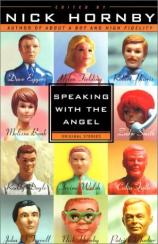Speaking With the Angel
Review
Speaking With the Angel
![]() The
The
brainchild of pop-lit goldenboy Nick Hornby, SPEAKING WITH THE
ANGEL brings together 12 of today's hippest, hottest, coolest,
nowest authors from both sides of the pond --- including Helen
Fielding, Zadie Smith, Dave Eggers, Melissa Bank and Hornby
himself. Though extremely bankable in its abundance of talent and
trendiness (right down to the kitschy cover art), this collection
of first-person narratives was actually compiled in the name of
charity; specifically, TreeHouse, a school for autistic children
attended by Hornby's young son. All the more reason to acquire this
all original, often hilarious, always eclectic
collection.One
of the best stories in the collection comes from the amazingly
well-connected Hornby. Narrated by a bouncer turned art gallery
security guard, "Nipple Jesus" delivers a modern parable on the
foolishness and intolerance characteristic of both critics and
defenders of controversial artwork --- such as the portrait of the
crucified Christ created from thousands of tiny nipples cut from
porno magazines featured in Hornby's story. A long overdue smack in
the face for the laughably ignorant censors, scarily religious
zealots, controversy pandering artists, and free-speech soapboxers,
"Nipple Jesus" should be required reading for those people waiting
in line to gawk at the next "sensation" exhibit.I
recently wrote a scathing article about the "megalomaniac and
overrated" Dave Eggers and now, shamefaced, I must eat my words
(well, word...I still stand behind the former criticism). Put
simply, "After I Was Thrown in the River and Before I Drowned" is a
thoughtfully, compassionately, dare I say poetically? scripted
story. The dare-to-be-different narrative of the collection, it is
written from the perspective of a dog --- not just any dog, Steven
the dog, a very, very fast dog, a dog so in love with running and
jumping and the world, "Hooooooooooo!," that you're left feeling
terribly embarrassed when he says, "I feel good and I live on and
run and run and look at the people and hear their stupid
conversations coming from their slits for mouths and terrible
eyes."Roddy Doyle's homage to the male mid-life crisis, "The Slave,"
is a hilarious monologue on the perpetual inner dialogue running on
in the mind of the 42-year-old protagonist: "I never wanted to be a
man who wore slippers...[n]ow, I won't get out of bed if I'm not
certain they're right beside me."Another absolute standout in the collection is Patrick Marber's
"Peter Shelley," a sweet and funny and poignant portrait of teenage
courtship. As a completely undetected voyeur, the reader is privy
to the awkward, anxious, befuddled, hurried, but always tender
sexual exploration, and eventually epiphany, unfolding between
Marber's two 14-year-old burgeoning punkrockers. And in the end,
"Peter Shelley" reminds us of a time --- my god, so long ago ---
when we felt like we "could eat the world."Like
Marber, Zadie Smith, author of the epic WHITE TEETH, and Colin
Firth, literary newcomer and star of Hornby's memoir-turned-movie
FEVER PITCH, mine the familiar territory of male adolescence.
Unfortunately, and somewhat shockingly in the case of Smith, their
attempts are considerably less successful than Marber's.In
"I'm The Only One" Smith offers a mildly poignant and
uncharacteristically (that is, if after only one novel, we can
consider anything an author does "uncharacteristic") simple sketch
of a teenage boy who takes a cruel yet loving sort of pride in
parading his friend --- who, at 14, stands at 6 foot 9 inches ---
in front of his older sister, "as if the fact that he was so tall
was something to do with [him]." And while Firth's "The Department
of Nothing" is actually a very respectable, and certainly valiant
considering the company, first attempt at story writing, the piece
--- a long and at times touching tale about a boy and the wide-eyed
awe and unmitigated love he feels for his grandmother and her
fantastical stories --- leaves you with the feeling that author is
forcing his way into the mind of his teenage protagonist, maybe
trying just a little too hard to be vulnerable and sincere and
funny.Speaking of trying too hard to be funny --- or clever, edgy,
scandalous and every other adjective you can think of that, when
preceded by the phrase "trying to hard to be," spells disaster ---
what the hell were Irvine Welsh, John O'Farrell, and Helen Fielding
thinking when they wrote their stories? Welsh's "Catholic Guilt You
(Know You Love It)" is a boringly vulgar tale about some generic,
homophobic meathead who drops dead while screwing his best friend's
sister and, as some sort of cruel and ironic penance, is doomed to
rape his male friends till he "cease[es] to feel the guilt."
Subtlety has never been Welsh's strong suit, but in this case it
seems neither is plot, character development, style, or
theme.Sadly, John O'Farrell's "Walking Against The Wind" and Helen
Fielding's "Luckybitch" suffer from the most debilitating of all
literary maladies, It-Seemed-Like-A-Really-Good-Idea-At-The-Time
Syndrome. Our hearts go out to both authors --- O'Farrell for
thinking that chronicling one man's love of mime and the obstacles
he faces in this blatantly anti-mime world of ours over the course
of 30 pages would make a sustainably hilarious and satiric story;
and Fielding for not living up to her Bridget Jones certified wit
potential with her brief tale about an old lady who, like all old
ladies claim to be, was "the former Grace Kelly of Hampshire" and a
minx in her day, though is now reduced to hitting the panic button
from the bathroom floor of her nursing home. To be fair, both
stories are funny for the first 5 pages, it's just that come page 6
the joke grows very old very quickly.Simultaneous to finishing SPEAKING WITH THE ANGEL I came across
Walter Kirn's review of Rick Moody's DEMONOLOGY in the New York
Times. Unresolved about how to handle the fact that this
charitable, star-studded collection had more than a few less than
great selections, I decided to adopt the sentiments expressed in
the first sentence of Kirn's piece as my official stance on the
book: Good short story collections, like good record albums, are
almost always hit-and-miss affairs --- successful if they include 3
or four great tracks, wildly successful if they have five. Into
which category, then, does SPEAKING WITH THE ANGEL fall? If
considering it "wildly successful" will prompt you to buy this book
and donate some much needed money to a very worthy cause, I'd be
willing to call it a work of unparalleled literary
genius.
Reviewed by Sarah Brennan on January 23, 2011
Speaking With the Angel
- Publication Date: February 1, 2001
- Genres: Short Stories
- Paperback: 233 pages
- Publisher: Riverhead Trade
- ISBN-10: 1573228583
- ISBN-13: 9781573228589




